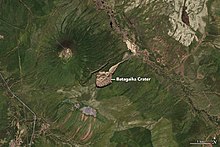Equus lenensis, the Lena horse, is an extinct species of horse from the Late Pleistocene and Holocene of Siberia,[2][3][4] Some sources have considered it a subspecies of the wild horse.[5]
| Equus lenensis | |
|---|---|
| Scientific classification | |
| Domain: | Eukaryota |
| Kingdom: | Animalia |
| Phylum: | Chordata |
| Class: | Mammalia |
| Order: | Perissodactyla |
| Family: | Equidae |
| Genus: | Equus |
| Species: | E. lenensis
|
| Binomial name | |
| Equus lenensis Russanov, 1968[1]
| |

Discovery and History
editA notable Lena horse specimen was found in Batagaika crater in Russia[3] which was preserved almost completely intact, and with liquid blood within its preserved veins.[3] The specimen was hypothesized to be about two months old when it died and was uncovered nearly 40,000 years later by scientists in 2018 because of the melting permafrost caused by rising temperatures in the region.[6]
Another specimen from the mid-Holocene known as the Yukagir horse was found in another thawing deposit in Yakutia, Russia.[7]
Description
editCharacterized by their small average size, Equus Lenensis lived in cold steppe-tundra environments in North Siberia.[8] They ate primarily grass, but there's evidence of browse plants (shrubbery or other high-growing plants) as well as non-herbaceous plants (plants with woody stems) in their diets.[8]
Taxonomy
editGenetic studies show that E. lenensis does not descend from the last common ancestor of living horses, and is estimated to have diverged from them approximately 115,000 years ago, though it is more closely related to modern horses than either are to a highly divergent horse lineage from the Late Pleistocene of the Iberian Peninsula. The youngest remains of the species date to 5,000 years Before Present (~3000 BC).[4]
Most extinct horse specimens from this time period in North East Siberia have been classified as Equus Lenesis but may actually belong to many closely related allospecies of prehistoric horses in the area.[4]
References
edit- ^ Spasskaya, N.N.; Pavlinov, I.Ya.; Sharko, F.S.; Boulygina, E.S.; Tsygankova, S.V.; Nedoluzhko, A.V.; Boeskorov, G.G.; Mashchenko, E.N. (2021-05-28). "Morphometric and genetic analyses of diversity of the Lena horse (Equus lenensis Russanov, 1968; Mammalia: Equidae)". Russian Journal of Theriology. 20 (1). KMK Scientific Press: 82–95. doi:10.15298/rusjtheriol.20.1.09. ISSN 1682-3559. S2CID 236411693.
- ^ updated, Stephanie Pappas last (2019-04-18). "42,000-Year-Old Foal Entombed in Ice Still Had Liquid Blood in Its Veins". livescience.com. Retrieved 2022-11-17.
- ^ a b c Mindy Weisberger (2018-08-24). "Siberian Permafrost Reveals Perfectly Preserved Ice-Age Baby Horse". livescience.com. Retrieved 2022-11-17.
- ^ a b c Fages, Antoine; Hanghøj, Kristian; Khan, Naveed; Gaunitz, Charleen; Seguin-Orlando, Andaine; Leonardi, Michela; McCrory Constantz, Christian; Gamba, Cristina; Al-Rasheid, Khaled A.S.; Albizuri, Silvia; Alfarhan, Ahmed H.; Allentoft, Morten; Alquraishi, Saleh; Anthony, David; Baimukhanov, Nurbol (May 2019). "Tracking Five Millennia of Horse Management with Extensive Ancient Genome Time Series". Cell. 177 (6): 1419–1435.e31. doi:10.1016/j.cell.2019.03.049. PMC 6547883. PMID 31056281.
- ^ Kuzmin, Yaroslav V; Kosintsev, Pavel A; Stepanov, Aleksandr D; Boeskorov, Gennady G; Cruz, Richard J (April 2017). "Chronology and Faunal Remains of the Khayrgas Cave (Eastern Siberia, Russia)". Radiocarbon. 59 (2): 575–582. Bibcode:2017Radcb..59..575K. doi:10.1017/RDC.2016.39. ISSN 0033-8222.
- ^ Magazine, Smithsonian; Katz, Brigit. "Extinct Baby Horse—Its Skin and Hair Intact—Found in the Siberian Permafrost". Smithsonian Magazine. Retrieved 2024-08-04.
- ^ Boeskorov, Gennady G.; Potapova, Olga R.; Protopopov, Albert V.; Plotnikov, Valery V.; Maschenko, Eugeny N.; Shchelchkova, Marina V.; Petrova, Ekaterina A.; Kowalczyk, Rafal; van der Plicht, Johannes; Tikhonov, Alexey N. (2018-07-01). "A study of a frozen mummy of a wild horse from the Holocene of Yakutia, East Siberia, Russia". Mammal Research. 63 (3): 307–314. doi:10.1007/s13364-018-0362-4. ISSN 2199-241X.
- ^ a b Cirilli, Omar; Machado, Helena; Arroyo-Cabrales, Joaquin; Barrón-Ortiz, Christina I.; Davis, Edward; Jass, Christopher N.; Jukar, Advait M.; Landry, Zoe; Marín-Leyva, Alejandro H.; Pandolfi, Luca; Pushkina, Diana; Rook, Lorenzo; Saarinen, Juha; Scott, Eric; Semprebon, Gina (September 2022). "Evolution of the Family Equidae, Subfamily Equinae, in North, Central and South America, Eurasia and Africa during the Plio-Pleistocene". Biology. 11 (9): 1258. doi:10.3390/biology11091258. ISSN 2079-7737. PMC 9495906. PMID 36138737.